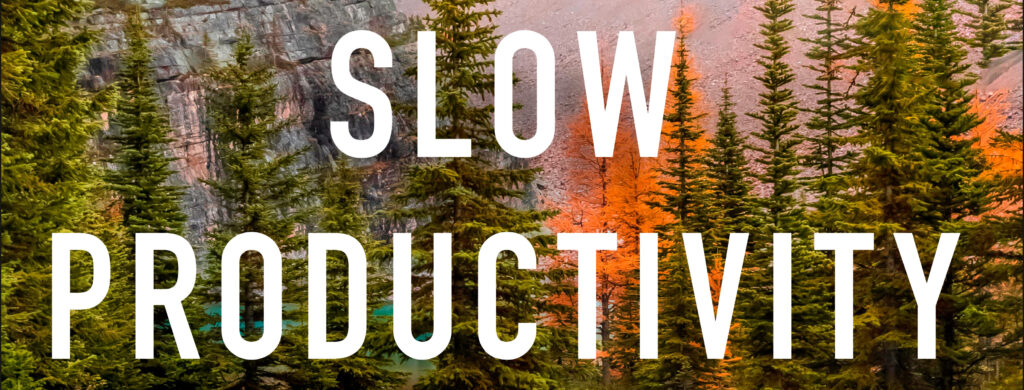In his new book, Cal Newport emphasizes the importance and impact of slowing down at work.
Slow Productivity might seem like a contradiction in terms, but it turns out to be the key to surviving—and even thriving—in the modern world of knowledge work. Author Cal Newport starts his new book of that title—available for purchase here—by completely redefining productivity, a term that has become hackneyed, or even hated, in recent years. Newport’s refreshing vision is that productivity does not depend on how busy you are; instead, productivity centers on what you produce that is of high quality and lasting value, which can require long periods of time. Slowness does not equal laziness. In fact, a slower pace can be necessary for success.
I experienced this in my own life last year, when I took a six-month sabbatical from work. Although it sounds counterintuitive, taking time off was deeply productive. Traveling to new places with new rhythms of life enabled me to recover from burnout and find the space to recharge my creativity. When sabbatical ended, I came back to work with renewed energy and enthusiasm.
Admittedly, these ideas can appear suspect if you’re working in an office where you’re drowning in emails and endless to-do lists. I’ve been there, too. Newport calls this pseudo-productivity, which he defines as, “The use of visible activity as the primary means of approximating actual productive effort” (p. 22). In other words, sending a whole bunch of emails counts as productivity, right? Pseudo-productivity is attractive because it’s easy to see and to measure visible activity, in contrast to deep work. If you’ve ever spent an entire day responding to emails, only to find that your most important task for the day never got done, you know exactly what Newport is describing.
Armed with this definition of pseudo-productivity, we can explore its antithesis, slow productivity. Newport outlines three main tenets of slow productivity:
"1. Do fewer things.
2. Work at a natural pace.
3. Obsess over quality” (p. 41).
Do Fewer Things
At first glance, this one is hard to swallow—it sounds great, but also fantastically out of reach for the typical knowledge worker. This is especially true of the example Newport gives of Jane Austen and the quiet family cottage where she focused on writing her famous novels. Can you imagine finding time to draft Pride and Prejudice if you had to keep up with email? Newport acknowledges this challenge: “My goal . . . is to persuade you not to give up on this aspirational vision of engineered simplicity. It is possible in most modern work settings, if you’re willing to be creative—and perhaps, at times, even radical—in how you think about selecting and organizing your work” (p. 54). He then goes on to explain, in great detail, strategies for keeping one’s workload manageable, along with examples featuring modern knowledge workers who have successfully put these principles into practice.
Work at a Natural Pace
Newport’s vision of working at a natural pace centers on three main propositions: “take longer,” “embrace seasonality,” and “work poetically” (p. 125, 136, and 153, respectively). He expands each of these propositions with more specific logistical suggestions and concrete examples.
Take Longer: It turns out that slowing down is not only more humane, but also more effective at producing great work. Newport has practical suggestions involving various time scales, from five-year planning all the way down to daily tasks.
Embrace Seasonality: Yes, this can include sabbaticals, but it also encompasses entire seasons where you work less intensely, as well as weekly rhythms that enable you to rest on a regular basis while still getting things done at a steady pace.
Work Poetically: This is less about writing poetry and more about finding scenic locations and meaningful rituals that inspire you to do your best work.
Obsess Over Quality
Newport describes this as “the glue that holds the practice of slow productivity together” (p. 173). It isn’t enough just to whittle down your project list or slow your pace; you also need to be producing work that is such high quality that others notice. That obsession with quality and its impressive results, in turn, give you the leverage you need to design a work situation that matches your vision for a life well-lived. Ultimately, slow productivity gives you freedom—an idea that’s resonated throughout the centuries.
Jane Austen isn’t the only historical thinker whom Newport references. He also tells the stories of Isaac Newton, Marie Curie, Galileo, and others whose brilliant work unfolded slowly but had lasting impact. Although it’s sometimes tempting to despair of ever accomplishing anything of significance in the age of email, we can choose to view these intellectual forebears as sources of inspiration, while finding ways to live out slow productivity in our own lives.
Newport’s point is that while knowledge work in the twenty-first century has unique challenges, pursuing the “art of accomplishment without burnout” is a fundamentally human quest that connects us with those who have gone before us. In our fundraising industry that struggles with burnout and high turnover, the ideas in Slow Productivity might be just what we need to stay in it for the long haul.






